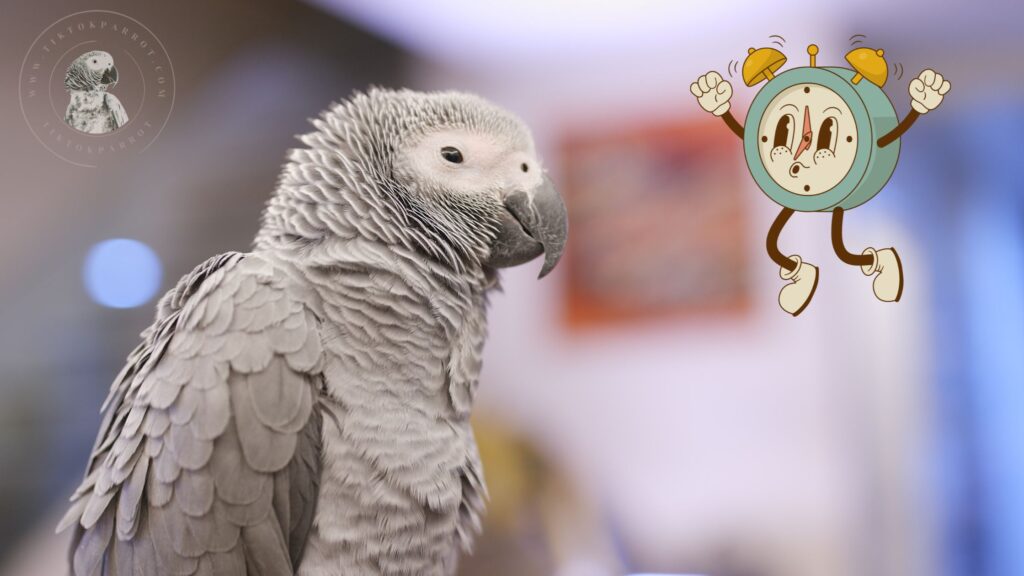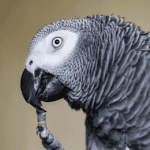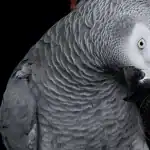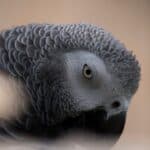The Eye-Opening World of African Grey Parrots: Do They Dream of Electric Mice?
Hey there, parrot pals! Welcome back to TiktokParrot, your one-stop shop for all things feathered fun and, sometimes, feathered mysteries! Today, we’re venturing into the realm of nighttime parrot behavior – specifically, the question that keeps many a curious owner up at night (ironically): do African Grey parrots sleep with their eyes open?
Discover if African Grey parrots sleep with their eyes open, exploring unique sleep habits and ensuring your feathered friend’s comfort and safety.
Imagine catching your African Grey perched on their stand, seemingly fast asleep, yet with one eye cracked open. It can be a bit unsettling, like they’re secretly judging your late-night snacking habits. Fear not, fellow parrot parents! While it might look a little spooky, this behavior is actually quite normal for African Greys, and other birds, in the wild.
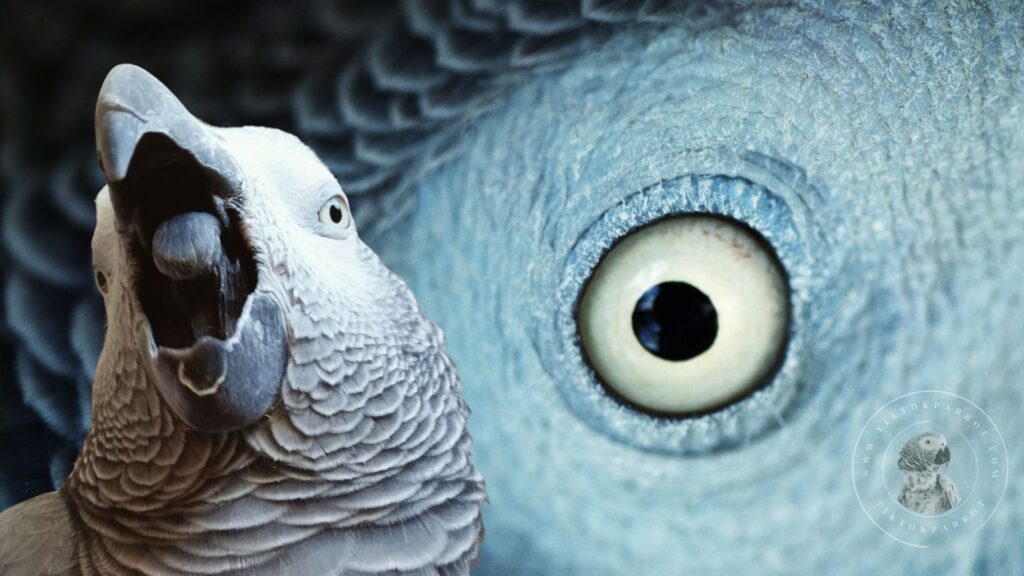
The Sandman Cometh on Silent Wings
First off, understanding a parrot’s sleep habits requires us to fluff up the old knowledge nest with some basic birdy bedtime facts. African Grey Parrots, much like their human pals, need a good chunk of shut-eye to stay sharp and chirpy. We’re talking about a solid 10-12 hours of dreamland diving. But here’s where it gets interesting – their eyelids aren’t just for blinking in disbelief at your choice of outfit.
how do african grey parrots sleep?
Unlike humans who blissfully (or not so blissfully, depending on your sleep quality) drift off to dreamland with both eyes shut, birds have a different sleep style entirely. They operate on a unihemispheric sleep pattern, meaning one half of their brain sleeps at a time, while the other half remains alert.
African Grey parrots, like many other birds, have a unique sleep pattern compared to humans. Here’s the breakdown:
- Safety First: In the wild, where danger lurks around every corner (or rather, tree branch), staying partially vigilant keeps them safe. With one eye open, they can still detect potential threats, like a hungry predator, even while catching some shut-eye. It’s like having a built-in night watchman – feathered style. This sleep style allows them to keep one eye open to watch for predators even while catching some shut-eye. It’s like having a built-in night watchman!
- Predator Patrol: Even during the day, birds with chicks might use this unihemispheric sleep to keep an eye on their precious offspring while catching a quick nap. Imagine a busy parrot parent, one eye on the little ones, the other catching some quick rest – multitasking at its finest!
- Unihemispheric Sleep: Unlike humans who sleep with both brain hemispheres inactive, African Greys use unihemispheric sleep. This means one half of their brain sleeps while the other stays alert.
- Nictitating Membrane: They also have a special eyelid called the nictitating membrane that acts like a third eyelid, protecting their eyes while still allowing them to see a little.
- Deep Sleep Signs: When they feel truly safe, like in your loving home, they might close both eyes for deep sleep. Signs of this include fluffed feathers, quietness, and slight loss of balance on their perch.
- Light Cycles: African Greys are very attuned to light. They wake up with the sunrise and don’t have a snooze button, although they might take short naps during the day.
So, while they might seem to be sleeping with one eye open sometimes, it’s a normal adaptation for survival in the wild. In your care, they can feel comfortable enough to sleep soundly with both eyes closed.
how many hours do african greys sleep?
African Grey parrots, like most parrots, require a good night’s rest to function at their best. The ideal amount of sleep for an African Grey parrot is generally considered to be between 10-12 hours per night. This allows them to be well-rested, mentally sharp, and full of energy for playing, interacting, and exploring their environment.
However, it’s important to remember that sleep needs can vary slightly depending on individual birds. Some African Greys might be content with a bit less sleep (around 8-10 hours), while others might require closer to 12-14 hours to feel truly rested. Factors like age, activity level, and overall health can also influence sleep needs. Here are some additional things to consider:
- Age: Younger African Greys, like chicks and juveniles, might require slightly more sleep than adults, up to 14 hours in some cases.
- Activity Level: Highly active African Greys that spend a lot of time playing and interacting may need more sleep to compensate for the energy they expend.
- Health: If your African Grey is unwell or stressed, they might require more sleep to recover.
Signs Your African Grey Needs More Sleep:
- Lethargy and lack of energy
- Increased irritability and aggression
- Difficulty concentrating
- Decreased appetite
- Excessive feather picking
Tips for Ensuring Your African Grey Gets Enough Sleep:
- Provide a quiet and dark sleeping environment at night. Cover their cage with a breathable sleep cage cover.
- Maintain a consistent sleep schedule, putting them to bed and waking them up at similar times each day.
- Avoid excessive stimulation before bedtime, such as loud noises or bright lights.
- Ensure they have access to fresh food and water before bedtime.
By following these tips and monitoring your African Grey’s individual needs, you can help them get the quality sleep they require for a happy and healthy life.
So, Do African Greys ALWAYS Sleep with One Eye Open?
Not necessarily. In a safe and secure environment, like a loving home with you by their side, your African Grey might feel comfortable enough to shut down both eyes for a deep snooze. Here are some signs your feathered friend is truly catching some quality Zzz’s:
- Fluffy Fluffing: This one’s a giveaway! When your African Grey fluffs up their feathers, it’s a sign they’re getting comfy and ready for a good sleep. They might even tuck their head under their wing for extra warmth and security.
- Quiet Time: No more chatter, squawks, or playful antics? It could be a snooze fest! If your usually vocal friend is unusually silent, chances are they’re off in dreamland.
- Balance Beam Blues: Does your African Grey seem a little wobbly on their perch? This loss of balance is a normal sign of deep sleep in birds. Don’t worry, they won’t take a tumble – their instincts will kick in if they need to adjust their position.
A Blink into the Abyss
So, do these feathery Einsteins sleep with one eye open, gripping their perch tight? As I mentioned above not exactly. African Greys, and birds in general, are equipped with a nifty little feature called the nictitating membrane. Think of it as a thin, translucent eyelid that slides sideways, like nature’s own pair of nighttime goggles. This allows them to moisten and protect their eyes without fully committing to the vulnerability of closing them completely.
However, when it’s lights-out for real, these parrots do close their eyes to catch those elusive Z’s. The real kicker is that they can control this membrane independently in each eye. So, in a way, they can keep an eye out for trouble even while napping. It’s not quite the same as sleeping with their eyes wide open, but it’s as close as it gets without venturing into horror movie territory.
Perch Perils and Pirate Dreams
Now, you might be wondering, why the need for such James Bond-level sleep tactics? Well, as I discussed above in the wild, staying alert even during vulnerable moments like sleep can be the difference between becoming someone else’s midnight snack and living to squawk another day. It’s all about survival, baby! But in the safety of your home, it’s more about catching those dream waves where they’re the captain of the ship, sailing the seven seas of their bird-brain imagination.
The Snooze Button Doesn’t Exist Here
Ever noticed how your feathered friend seems to be up with the dawn chorus, regardless of how late the party went the night before? Birds, including our intellectual African Greys, are incredibly attuned to light cycles. This means they’re ready to start the day at the crack of dawn, whether you are or not. And no, they don’t have a snooze button, though they might occasionally snooze off for short periods during the day to catch up on beauty sleep.
The Final Chirp!
While the half-open eye might seem strange to us humans, it’s a perfectly normal adaptation for African Greys and other birds. It allows them to stay safe and vigilant in the wild, and in your loving home, they might feel comfortable enough to sleep soundly with both eyes closed.
Remember, every parrot is an individual. Some Greys might be more prone to the unihemispheric sleep pattern than others. If you’re concerned about your bird’s sleep habits, always consult with your avian veterinarian.
My Closing Thoughts
So, to wrap up our feathery bedtime story: Do African Grey Parrots sleep with their eyes open? Not in the way you might think, but their unique adaptations allow them a semblance of vigilance even in slumber. It’s just one of the many quirks that make these parrots fascinating companions, capable of keeping one eye on the sky (or the living room) even while they’re off in dreamland.
Got any sleepover stories or midnight murmurs from your own beaky buddy? I would love to hear your experiences and any tips you’ve discovered for ensuring your African Grey gets a good night’s rest. Share your stories in the comments below and join our flock of night owls and early birds alike!
If you found this blog helpful, It would be great if you could share it with your family and friends who might find it useful as well.
You might like to read these as well 🙂
Decoding Parrot Minds: Bird Behavior, Emotions And Intelligence
Understanding Your African Grey Parrot Nature and Type
What are the behavior problems with African Greys?
The Importance of a Cage for Your African Grey Parrot
10 Basic Care Tips for African Grey Parrot Owners
Signs that an African Grey is unhappy with you
For more useful content about African grey parrots, you can subscribe my site with your email to get notification upon publishing a new blog, the subscribe box you can see on the right side of this page. Also if you get an alert on your web browser while browsing my site, allow it and that will also give you an alert whenever I publish a new blog. 🙂
Stay safe and much love!


Hey there! 🐾 Looking for top-notch pet supplies or anything on Amazon?
Support our site by shopping on Amazon through our this referral link, it will not cost you extra!
Your purchases on Amazon can help us continue providing valuable content.
Thank you for your support! 🛍️

